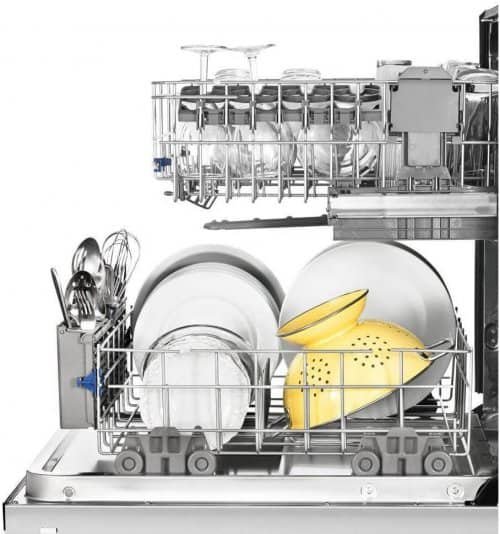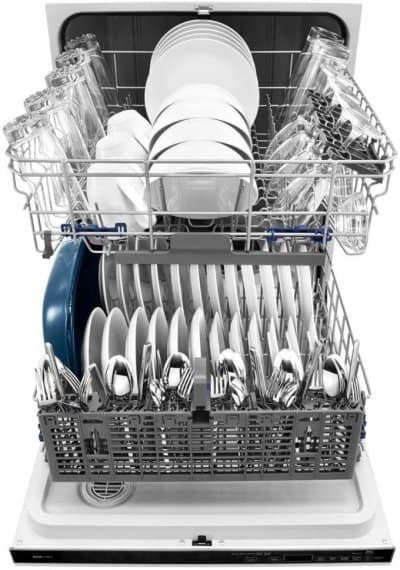The dishwasher is a modern convenience that helps save time and effort in the kitchen. However, you may have noticed a frustrating issue: a milky film on your once-sparkling glasses. This article aims to explore the causes of this film, its impact on glassware, prevention and removal methods, common myths, troubleshooting other causes, and provide you with a comprehensive understanding of this phenomenon.
When you expect your dishwasher to leave your glassware crystal clear and spotless, discovering a milky film can be disheartening. It not only affects the aesthetics of your glasses but can also hinder their clarity and reduce their lifespan. Understanding the causes and solutions for this problem will help you achieve sparkling clean glasses after every wash.
Table of Contents
Understanding the Milky Film on Glasses
What Causes the Milky Film?
The milky film on glasses from the dishwasher can be attributed to various factors. Two primary causes are hard water and detergent residue.
Hard Water and Mineral Deposits
Hard water contains a high concentration of minerals like calcium and magnesium. When the dishwasher heats the water, these minerals can precipitate onto the glassware, resulting in a cloudy film. The hardness of water varies in different regions, and areas with higher mineral content are more prone to this issue.
Detergent Residue
Detergents and dishwasher tablets contain surfactants and additives that help in cleaning dishes effectively. However, if not rinsed off completely during the wash cycle, they can leave a filmy residue on the glasses. This residue is more noticeable on glass surfaces due to their smoothness.
Impact on Glassware
Aesthetics and Appearance
The milky film on glasses detracts from their visual appeal. Instead of the pristine clarity you desire, your glassware may appear dull and lackluster. It can diminish the overall presentation of your table setting, affecting the enjoyment of meals and drinks.
Impaired Clarity
The film also affects the transparency and clarity of your glasses. It creates a hazy layer that interferes with light transmission, making it harder to appreciate the color, texture, and effervescence of beverages. This can diminish the sensory experience and the pleasure derived from drinking.
Reduction in Lifespan
The presence of a milky film can accelerate the wear and tear on glassware. The film contains mineral deposits and detergent residue, which can gradually etch the surface of the glass. Over time, this etching weakens the structure of the glass, making it more susceptible to cracking, chipping, and breakage. This can significantly reduce the lifespan of your favorite glassware.

Prevention and Removal Methods
To ensure your glasses remain free from the milky film, it is essential to implement preventive measures and utilize effective removal methods. Here are some recommendations:
Using Rinse Aid
Rinse aid is a helpful additive that aids in the prevention of water spots and film on glassware. It reduces the surface tension of the water, allowing it to rinse away more effectively. By incorporating rinse aid in your dishwasher routine, you can minimize the chances of the milky film forming on your glasses.
Adjusting Dishwasher Settings
Check your dishwasher settings to ensure they are optimized for your water hardness level. Many dishwashers offer options to adjust the amount of rinse aid and detergent used, as well as the water temperature. Experimenting with these settings can help combat the milky film issue by finding the optimal combination for your specific water conditions.
Handwashing with Vinegar
If you notice a milky film on your glasses after a dishwasher cycle, you can try handwashing them with vinegar. Fill a basin with equal parts of white vinegar and warm water, then soak the affected glasses for about 15 minutes. Afterward, scrub them gently with a soft sponge or cloth, rinse thoroughly, and dry. Vinegar’s acidic properties help dissolve the mineral deposits and detergent residue, restoring the clarity of your glasses.
Utilizing Citric Acid
Citric acid, available in powdered form or as citric acid-based dishwasher cleaners, is another effective remedy for removing the milky film. Follow the instructions provided with the product to add it to an empty dishwasher and run a cycle. The citric acid helps dissolve the mineral deposits and detergent residue, leaving your glasses pristine and film-free.
Regular Cleaning and Maintenance
Prevention is key, so it’s important to establish a routine for regular dishwasher cleaning and maintenance. This includes cleaning the dishwasher’s filter, checking and unclogging spray arms, and inspecting the rubber seals for any build-up. A clean dishwasher ensures optimal performance and reduces the likelihood of the milky film appearing on your glasses.
Common Myths about Dishwasher Film
There are several misconceptions surrounding the milky film issue. Let’s debunk some of the common myths:
Using More Detergent Solves the Issue
Contrary to popular belief, using an excessive amount of detergent will not eliminate the milky film. In fact, it can exacerbate the problem by leaving behind more residue. Stick to the recommended detergent amount and focus on other prevention and removal methods.
High-Quality Dishwasher Tablets Eliminate Film
While high-quality dishwasher tablets can contribute to cleaner dishes, they are not a foolproof solution for the milky film issue. Other factors, such as water hardness and rinsing techniques, play a significant role. It’s important to consider multiple approaches to tackle the problem effectively.
Dishwasher Cleaning Products Are Unnecessary
Some people believe that using dishwasher cleaning products is unnecessary, assuming that the dishwasher’s regular cleaning cycle will suffice. However, dishwasher cleaning products specifically target the build-up of mineral deposits and detergent residue, providing a deeper clean and reducing the chances of the milky film formation.
Troubleshooting Other Causes
In some cases, the milky film may be caused by factors other than hard water and detergent residue. Here are two common issues to consider:
Cloudiness Due to Etching
Etching occurs when the surface of the glass becomes pitted or corroded over time. This can give the appearance of a milky film, but it is not removable. Etching is typically caused by a combination of high water temperature, harsh detergents, and soft glass. Unfortunately, once etching has occurred, it is irreversible. To prevent etching, avoid using high water temperatures and harsh detergents, and opt for glassware specifically labeled as resistant to etching.
Scratched Glass Surfaces
Sometimes, what appears to be a milky film can actually be scratches on the glass surface. Scratches can create a cloudy or hazy appearance. To prevent scratches, avoid using abrasive scrubbers or harsh cleaning agents on your glassware. Instead, use gentle cleaning methods and handle the glasses with care.
Why does the milky film only appear on glasses?
The smooth surface of glassware makes the milky film more noticeable. It is caused by mineral deposits and detergent residue.
Can I use bleach to remove the film?
Bleach is not recommended for removing the milky film on glasses. It can be harsh on glassware and may cause damage.
Does the temperature of the dishwasher affect film formation?
Yes, higher water temperatures can contribute to the formation of the milky film. Adjusting dishwasher settings can help mitigate this issue.
Are there any DIY remedies for removing the milky film?
Yes, you can try handwashing with vinegar or utilizing citric acid to remove the film. These remedies help dissolve mineral deposits and detergent residue.
Should I avoid using the dishwasher altogether?
No, the dishwasher is a convenient appliance. By implementing preventive measures and proper maintenance, you can enjoy clean and clear glassware.
Conclusion
The milky film on glasses from the dishwasher can be a frustrating issue, affecting the aesthetics and clarity of your glassware. However, by understanding the causes and implementing preventive measures, you can maintain sparkling clean glasses. Regular cleaning, adjusting dishwasher settings, and utilizing remedies like rinse aid, vinegar, and citric acid can help eliminate the film and restore the beauty of your glassware. Remember to debunk common myths and troubleshoot other potential causes to ensure the best results.

